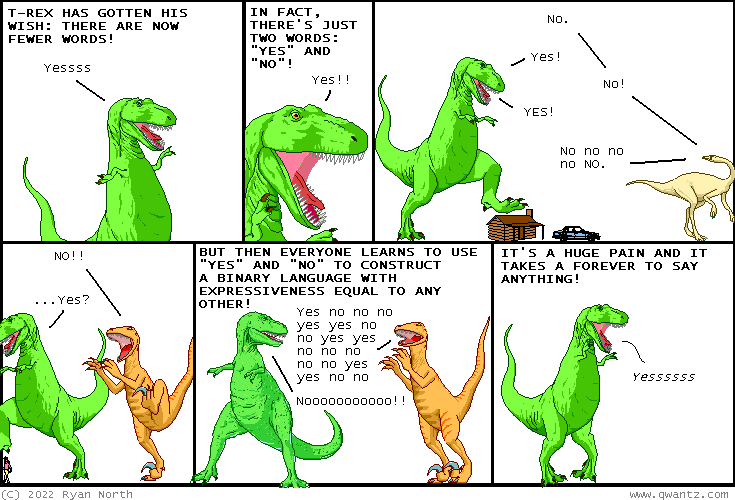Words: Too many? Too few?
« previous post | next post »
In Dinosaur Comics for 10/17/2022, T-Rex seems to encounter a lexicographical problem:
Mouseover title: "i'll be communicating entirely through glances and MAYBE raised eyebrows from now on"
Archive description: "words were a mistake, an error, a blunder, a blooper, a fault, a folly, a gaffe, an oversight, a misjudgment, a slip-up, a mix-up, a trip-up, a series of errata,"
I wrote "seems to encounter a lexicographical problem" because the issue is really rhetorical or compositional — it's not what words (and phrases) exist, or what they mean, but rather which word or phrase T-Rex should choose to express a particular concept, presumably in a particular context for a particular audience.
In the strip from 10/21/2022, things go the other way:
Mouseover title: "y'nooooooooo"
Archive description: "okay maybe we can have a few more words. i will allow 'whatsit' and 'zammo-whammo'"
The echoes Out There include Zipf's law of abbreviation, the principle of least effort, and the concept of joint optimization of effort and efficacy as developed in various areas of linguistics (and elsewhere).
See also: "No words, or too many", 1/30/2009.


Luke Davis said,
October 27, 2022 @ 7:24 am
Words, huh, yeah
What are they good for?
Absolutely something
Cervantes said,
October 27, 2022 @ 9:12 am
A couple of comments. First of all, those words don't all mean the same thing. In fact, some of them aren't even particularly close in meaning. Sovereign, for example, does not imply any sort of monarchy. The U.S. government is sovereign. Royal means pertaining to a monarch, but regal has more of a connotation of the qualities associated with a monarch or entities appropriate for one. Imperial and royal refer to different kinds of sovereigns altogether. And so on. It is true that English has a large vocabulary compared to most languages. This is because it is a creole — it has a double vocabulary of French and Germanic (original English). Creolization also resulted in a simplified grammar, which in some cases also makes availability of additional vocabulary more useful. (E.g, near disappearance of the subjunctive.)
One could certainly say "a kingly meal," though actually I think princely seems more natural. But this is just the arbitrary way of words.
rpsms said,
October 27, 2022 @ 10:14 am
I find it odd that you single out "sovereign" as "not particularly close in meaning" ("especially a monarchy" is part of the primary definition), but give a pass for regal as having "connotation of qualities associated with" monarchy. I mean, this is exactly what is going on with sovereign in your example case of the US government.
KeithB said,
October 27, 2022 @ 10:25 am
Given the previous post, I think we can add "girl" to "yes" and "no".
Do they have thesauruses in other languages? (I had to look up the plural)
JPL said,
October 27, 2022 @ 4:22 pm
You might say that the meaning intended ("having the nature of a king or queen") is not applicable to a (description of a) meal, because kings and queens have to be human (or at least animate) beings, and food is not that; but one could say of a meal all plated and served, "Now that is a real royal (regal, kingly?) dinner!" and express a sense equivalent in important respects to "fit for a king/queen". (The word 'royal' is applied to all sorts of inanimate and abstract objects (e.g., "the royal silliness") and in relations other than the "nature" of the person.)
Tim Rowe said,
October 28, 2022 @ 2:09 am
Considering the description is being spoken by a large carnivore, it's quite possible their meal *does* have the nature of a king or queen.
David Marjanović said,
October 28, 2022 @ 3:44 pm
That's not what "creole" means as a technical term in linguistics. When a pidgin ends up with native speakers, those kids turn it into a creole by plugging all the most glaring gaps in the grammar and vocabulary (if there are any).
Creoles do start with simple grammars, and English contains a number of compromises between Old English and Old Norse that mostly constitute simplifications. But English syntax really isn't simple, for example.
And the present subjunctive is completely gone in spoken German from sea to shining mountains. It remains very important in journalistic writing (for reporting what people say and explicitly not expressing an opinion on it), but that's pretty much all that remains.